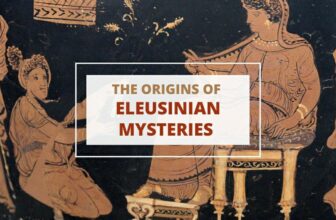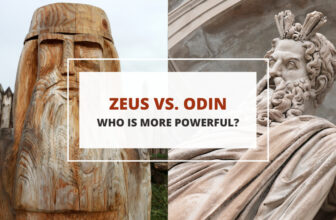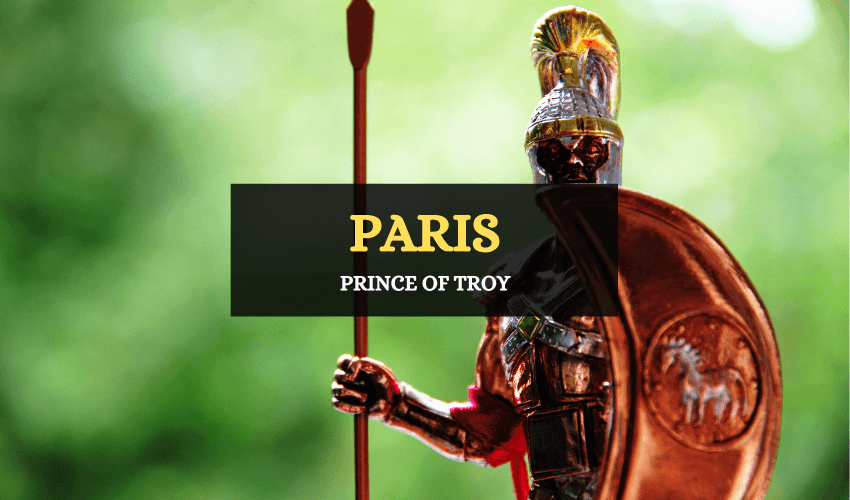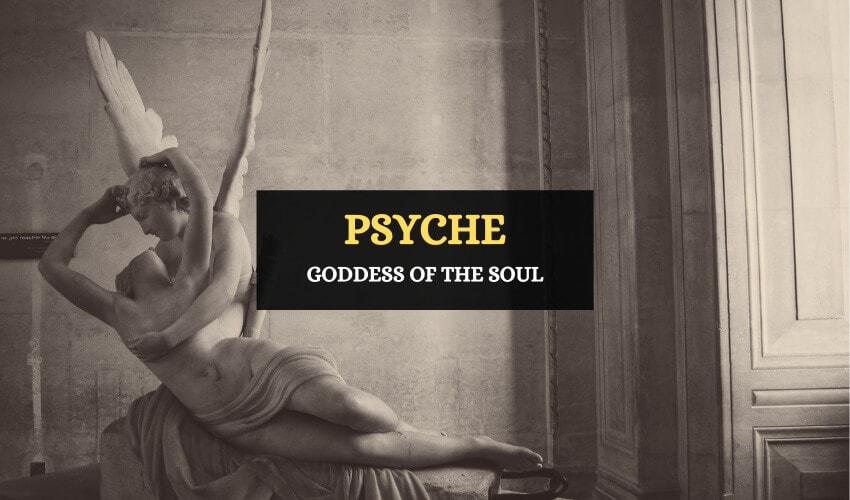
Table of Contents
Psyche was a mortal princess of unparalleled beauty, whose parentage is unknown. Her beauty was so astonishing that people began to worship her for it. Psyche would become the goddess of the soul in Greek mythology and the wife of Eros, the god of love. At the end of her story, she lived on Mount Olympus with the other gods, but she had to do many things to get there. Here’s a closer look at her myth.
Who is Psyche?
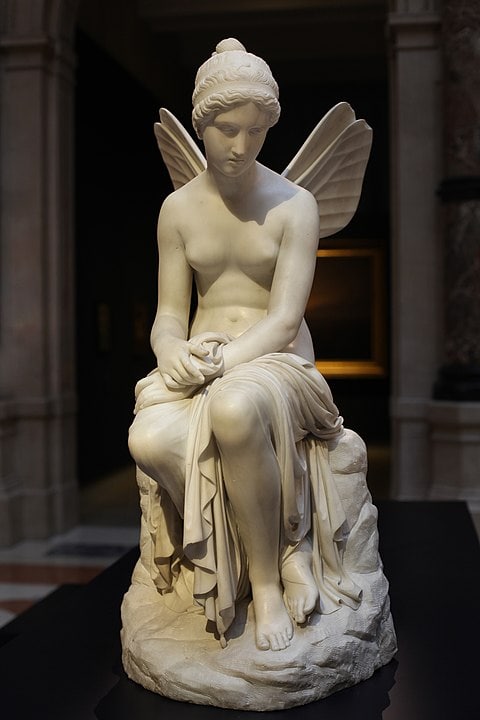
The most popular version of Psyche’s story comes from Metamorphoses by Apuleius. This story details the romance between Psyche, a mortal princess, and Eros, the god of love.
Because of Psyche’s beauty, mortal men were reluctant to approach her, so she remained alone. Over time, she was worshipped for her beauty. Naturally, this caught the attention of Aphrodite, the goddess of beauty.
Aphrodite found it troublesome that the mortals had started worshipping the beautiful Psyche. As the goddess of love and beauty, Aphrodite could not allow a mortal to receive that kind of praise. She grew jealous and decided to act against Psyche. To do so, she sent Eros to shoot her with one of his golden arrows and make her fall in love with some despicable man on earth.
Eros’ arrows that could make any mortal and god feel uncontrollable love for somebody. When the god of love tried to follow Aphrodite’s commands, he accidentally shot himself and fell in love with Psyche. In other versions, there was no love arrow involved, and Eros fell in love with Psyche for her beauty.
Psyche and Eros
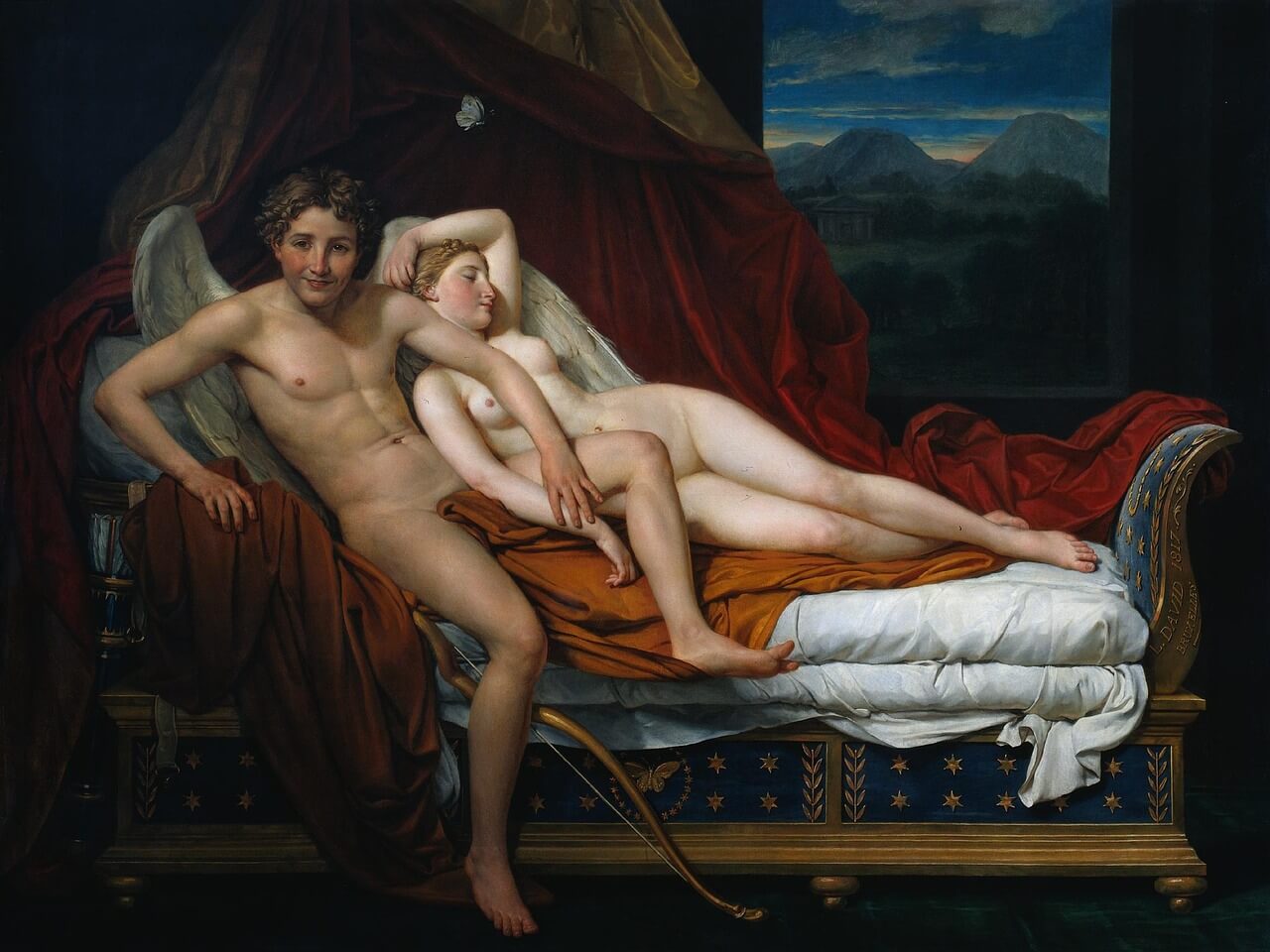
Eros took Psyche to a hidden castle, where he would visit her and love her, unbeknownst to Aphrodite. Eros hid his identity and always went to see her at night and left before dawn. Their encounters were in the dark, so she could not recognize him. The god of love also instructed Psyche not to look directly at him.
Psyche’s sisters, who lived in the castle with her to keep her company during the day, grew jealous of her lover. They began to tell the princess that her lover did not want her to see him because he was a hideous creature. Psyche then began to doubt Eros and wanted to see who he really was.
One night, the princess held a lamp in front of Eros while he was sleeping to see who her lover was. When Eros realized what Psyche had done, he felt betrayed and left her. Eros never returned, leaving Psyche brokenhearted and distraught. After that, she began to roam the world looking for her loved one, and in doing so, she fell into Aphrodite’s hands.
Aphrodite then commanded her to complete a series of complicated tasks and treated her as a slave. The goddess of beauty could finally act against the beautiful Psyche, who wanted nothing more than to reunite with Eros.
Psyche’s Tasks
Aphrodite assigned four tasks for Psyche to do, which would have been impossible for any mortal to successfully complete. Psyche prayed to Hera and Demeter to rescue her, but the goddesses would not interfere in Aphrodite’s affairs. Some versions state that Psyche received the help of certain deities, including Eros, who, hidden from Aphrodite, used his divine powers to help his lover.
The first three tasks were:
- Separating grains: For one of her tasks, Psyche was given wheat, poppy seeds, millet, barley, beans, lentils, and chickpeas in a mixed heap. Aphrodite commanded that the princess had to separate them all into different piles by the end of the night and then present them to her. It would have been impossible for Psyche to do this if she had not received the aid of an army of ants. The ants gathered and helped the princess separate the seeds.
- Gathering golden wool: Another task was to collect the golden wool from Helios’ sheep. The sheep dwelt in a sandbank of a dangerous river, and the animals themselves were violent to strangers. Aphrodite thought that one way or another, Psyche would finally die attempting to do this. however, the princess received help from a magical reed that told her how to collect the wool. Psyche did not need to go near the sheep since there was wool in the thorny bushes around the sandbank.
- Fetching water from Styx: Aphrodite commanded the princess to fetch water from the underworld river Styx. It would have been an impossible task for any mortal, but the princess received help from Zeus. Zeus sent an eagle to fetch the water for Psyche so that she would suffer no harm.
Psyche in the Underworld
The last task Aphrodite gave Psyche was to travel to the underworld to bring back some of Persephone’s beauty. The underworld was no place for mortals, and it was likely that Psyche would never be able to return from it. As Psyche was about to give up, she heard a voice that gave her precise instructions on how to get to the underworld. It also told her how to pay the ferryman, Charon, who would take her across the river of the underworld. With this information, Psyche was able to enter the underworld and to speak to Persephone. After hearing Psyche’s request, Persephone gave her a golden box and said that it contained part of her beauty and asked her not to open it.
Psyche left the palace and returned to the word of the living. However, her human curiosity would play against her. Psyche could not resist opening the box, but instead of finding the beauty of Persephone, she was met with the sleep of Hades, which induced a deep sleep. Finally, Eros went to her rescue and freed her from the everlasting slumber. After saving her, the two lovers could finally reunite.
Psyche Becomes a Goddess
Because of Aphrodite’s constant attacks against Psyche, Eros finally requested assistance from Zeus to help Psyche to make Psyche immortal. Zeus agreed to the request and instructed that for this to occur, Eros had to marry the mortal princess. Zeus then told Aphrodite that she should hold no grudge for he would immortalize the union by making Psyche a goddess. After this, Psyche’s servitude to Aphrodite ended, and she became the goddess of the soul. Psyche and Eros had a daughter, Hedone the goddess of pleasure.
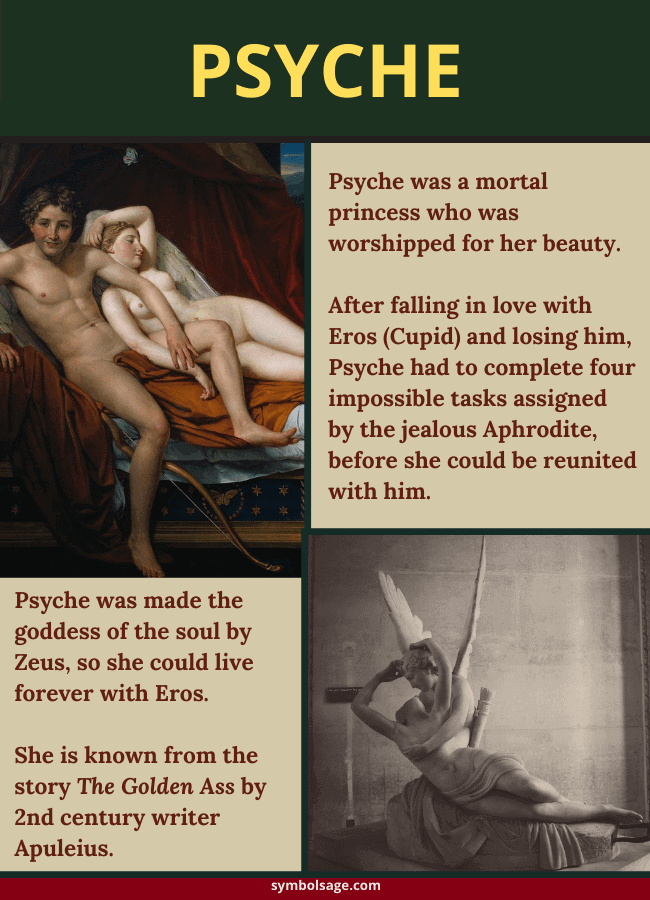
Psyche in the Western World
The goddess of the soul has had a remarkable influence outside of Greek mythology, with influence in science, language, art and literature.
The word psyche, which means the soul, mind or spirit, is at the root of psychology and its related fields of study. Several words such as psychosis, psychotherapy, psychometric, psychogenesis and many more are all derived from psyche.
The story of Psyche and Eros (Cupid) has been depicted in numerous works of art, such as The Abduction of Psyche by William-Adolphe Bouguereau, Cupid and Psyche by Jacques-Louis David and Psyche’s Wedding by Edward Burne-Jones.
Psyche also features in several literary works. One of the most famous is the poem by John Keats, Ode to Psyche, which is devoted to the praise of Psyche. In it, the narrator talks about Psyche and outlines his intention to worship her, a neglected goddess. In the third stanza, Keats writes how Psyche, although a newer goddess, is much better than the other gods although she isn’t worshipped as they are:
O latest born and loveliest vision far
– Stanza 3, Ode to Psyche, John Keats
Of all Olympus’ faded hierarchy!
Fairer than Phoebe’s sapphire-region’d star,
Or Vesper, amorous glow-worm of the sky;
Fairer than these, though temple thou hast none,
Nor altar heap’d with flowers;
Nor virgin-choir to make delicious moan
Upon the midnight hours…
Psyche FAQs
Psyche is a mortal who was turned into a goddess by Zeus.
Psyche’s parents are unknown but are said to be a king and queen.
Psyche has two unnamed sisters.
Psyche’s consort is Eros.
Psyche is the goddess of the soul.
Psyche’s symbols are butterfly wings.
Psyche and Eros had one child, a girl named Hedone, who would become the goddess of pleasure.
In Brief
So staggering was her beauty that it earned her the wrath of the goddess of beauty. Psyche’s curiosity played against her twice, and it almost led to her end. Fortunately, her story had a happy ending, and she became an important goddess on Mount Olympus. Psyche remains a notable figure nowadays for her influence in science.




